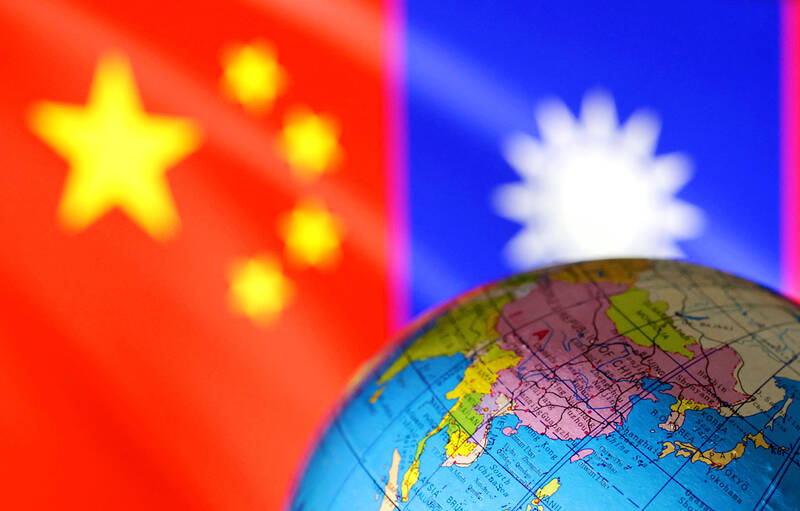The EU should impose financial sanctions that go “hard, fast and where it hurts” on China if a Taiwan crisis occurs, as “gradual sanctions escalation could be counterproductive,” a European Council on Foreign Relations (ECFR) policy brief published earlier this month said.
The pan-European think tank brief, published on Sept. 19 and written by senior policy fellow Agathe Demarais, aimed to draw insights from Western sanctions on Russia after its invasion of Ukraine and proposed sanctions deterrence against China in cross-strait conflict scenarios.
The EU’s threat of sanctions against China could be “game-changing” as Beijing, like Moscow, would think it improbable for 27 EU member states to unite on sanctions, Demarais wrote.

Photo: Reuters
Although China might threaten to retaliate against EU sanctions, “clear threats from the bloc would signal to Beijing that the costs of an aggression are even higher than those that the Chinese leadership already expects,” and Russia’s experience would prompt China to “think twice before brushing off Europe’s warnings,” she said.
However, traditional financial sanctions might not work as “China has spent years insulating itself from financial sanctions through ‘de-dollarization,’ ‘de-SWIFTing’ and the development of digital currencies,” she said.
By 2028, “threats of measures targeting China’s access to Western financial channels or currencies would be unlikely to alter Beijing’s calculus around Taiwan, as Chinese leaders are making fast progress toward financial self-sufficiency,” Demarais said.
“This means that Europe’s strongest leverage probably lies in trade measures targeting China’s access to the EU market,” she said.
China’s economic growth relies on exports of manufactured goods and that reliance “may well be its Achilles’ heel,” she said.
“Exports account for nearly 20 percent of China’s GDP, with nearly 40 percent of these going to G7-EU economies,” while 100 million jobs in China depend on foreign demand, including at least 45 million from G7-EU economies, she said.
The EU and its G7 partners should institute sanctions targeting imports of noncritical, finished consumer goods, particularly electronics and low-end goods, which accounted for 13 percent and 9 percent respectively of total Chinese exports, she said.
“A drop in the supply of these goods would be manageable for Western consumers, at least for a while. But for China, joint G7-EU measures curbing the shipments of these products would be hugely painful,” Demarais said.
“This means that if deterrence fails and EU policymakers choose to impose sanctions on China, then they should go hard and fast,” she said.
Gradual sanctions escalation would risk “supporting Chinese efforts to build long-term immunity to financial sanctions,” and would make it unlikely that the EU and its allies could “engineer a balance-of-payments crisis in China through a seizure of the country’s central bank reserves,” she said.
“European policymakers need to start discussing potential Taiwan-related triggers for sanctions on Beijing and map out the consequences of a drastic reduction in trade relations with China,” she said.
The EU would have to “think of financial compensation packages for those EU firms that will be most affected by sanctions and seriously beef up its ability to tackle sanctions disinformation,” she added.

The manufacture of the remaining 28 M1A2T Abrams tanks Taiwan purchased from the US has recently been completed, and they are expected to be delivered within the next one to two months, a source said yesterday. The Ministry of National Defense is arranging cargo ships to transport the tanks to Taiwan as soon as possible, said the source, who is familiar with the matter. The estimated arrival time ranges from late this month to early next month, the source said. The 28 Abrams tanks make up the third and final batch of a total of 108 tanks, valued at about NT$40.5 billion

Two Taiwanese prosecutors were questioned by Chinese security personnel at their hotel during a trip to China’s Henan Province this month, the Mainland Affairs Council (MAC) said yesterday. The officers had personal information on the prosecutors, including “when they were assigned to their posts, their work locations and job titles,” MAC Deputy Minister and spokesman Liang Wen-chieh (梁文傑) said. On top of asking about their agencies and positions, the officers also questioned the prosecutors about the Cross-Strait Joint Crime-Fighting and Judicial Mutual Assistance Agreement, a pact that serves as the framework for Taiwan-China cooperation on combating crime and providing judicial assistance, Liang

A group from the Taiwanese Designers in Australia association yesterday represented Taiwan at the Midsumma Pride March in Melbourne. The march, held in the St. Kilda suburb, is the city’s largest LGBTQIA+ parade and the flagship event of the annual Midsumma Festival. It attracted more than 45,000 spectators who supported the 400 groups and 10,000 marchers that participated this year, the association said. Taiwanese Designers said they organized a team to march for Taiwan this year, joining politicians, government agencies, professionals and community organizations in showing support for LGBTQIA+ people and diverse communities. As the first country in Asia to legalize same-sex

MOTIVES QUESTIONED The PLA considers Xi’s policies toward Taiwan to be driven by personal considerations rather than military assessment, the Epoch Times reports Chinese President Xi Jinping’s (習近平) latest purge of the Chinese People’s Liberation Army (PLA) leadership might have been prompted by the military’s opposition to plans of invading Taiwan, the Epoch Times said. The Chinese military opposes waging war against Taiwan by a large consensus, putting it at odds with Xi’s vision, the Falun Gong-affiliated daily said in a report on Thursday, citing anonymous sources with insight into the PLA’s inner workings. The opposition is not the opinion of a few generals, but a widely shared view among the PLA cadre, the Epoch Times cited them as saying. “Chinese forces know full well that